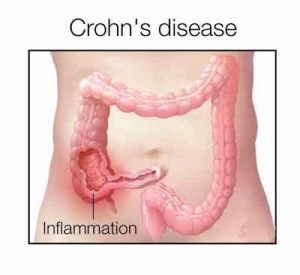- Home
- Editorial
- News
- Practice Guidelines
- Anesthesiology Guidelines
- Cancer Guidelines
- Cardiac Sciences Guidelines
- Critical Care Guidelines
- Dentistry Guidelines
- Dermatology Guidelines
- Diabetes and Endo Guidelines
- Diagnostics Guidelines
- ENT Guidelines
- Featured Practice Guidelines
- Gastroenterology Guidelines
- Geriatrics Guidelines
- Medicine Guidelines
- Nephrology Guidelines
- Neurosciences Guidelines
- Obs and Gynae Guidelines
- Ophthalmology Guidelines
- Orthopaedics Guidelines
- Paediatrics Guidelines
- Psychiatry Guidelines
- Pulmonology Guidelines
- Radiology Guidelines
- Surgery Guidelines
- Urology Guidelines
Management of Crohn's disease after surgical resection: AGA guidelines

Nearly one-half of patients with CD require bowel resection within the first 10 years of disease. However, surgery is not curative, and one-fourth of these patients will require at least another bowel resection within 5 years of index surgery. Surgical recurrence is usually preceded by clinical and endoscopic recurrence, which can occur in the neoterminal ileum in as many as 90% of patients within 12 months of surgical resection.Certain clinical features, such as the presence of penetrating disease, cigarette smoking, and multiple prior resections, are risk factors for disease recurrence. The presence and severity of endoscopic recurrence, as measured by the Rutgeerts’ score, is a strong predictor of clinical and surgical recurrence. The prevention of postoperative disease recurrence is a high priority given the morbidity associated with clinical and surgical recurrence and the long-term risk of short gut syndrome that may arise from multiple bowel resections.
U.S. Department of Health and Human Services,American Gastroenterological Association Institute has issued the Clinical practice guidelineson the management of Crohn's disease after surgical resection. Following are the major recommendations :
Major Recommendations
1. In patients with surgically induced remission of Crohn's disease (CD), the American Gastroenterological Association (AGA) Institute suggests early pharmacological prophylaxis over endoscopy-guided pharmacological treatment. (Conditional recommendation, Very low quality of evidence)
Comments: Patients, particularly those at lower risk of recurrence, who place a higher value on avoiding the small risks of adverse events from pharmacological prophylaxis and a lower value on the potential risk of early disease recurrence may reasonably select endoscopy-guided pharmacological treatment over prophylaxis.
2. In patients with surgically induced remission of CD, the AGA suggests using anti-tumor necrosis factor (TNF) therapy and/or thiopurines over other agents. (Conditional recommendation, Moderate quality of evidence)
Comments: Patients at lower risk for disease recurrence or who place a higher value on avoiding the small risk of adverse events of thiopurines and/or anti-TNF treatment and a lower value on a modestly increased risk of disease recurrence may reasonably choose nitroimidazole antibiotics (for 3–12 months).
3.In patients with surgically induced remission of CD, the AGA suggests against using mesalamine (or other 5-aminosalicylates), budesonide, or probiotics. (Conditional recommendation, Low quality of evidence and Very low quality of evidence)
4. In patients with surgically induced remission of CD receiving pharmacological prophylaxis, the AGA suggests postoperative endoscopic monitoring at 6 to 12 months after surgical resection over no monitoring. (Conditional recommendation, Moderate quality of evidence)
5. In patients with surgically induced remission of CD not receiving pharmacological prophylaxis, the AGA recommends postoperative endoscopic monitoring at 6 to 12 months after surgical resection over no monitoring. (Strong recommendation, Moderate quality of evidence)
6. In patients with surgically induced remission of CD with asymptomatic endoscopic recurrence, the AGA suggests initiating or optimizing anti-TNF and/or thiopurine therapy over continued monitoring alone. (Conditional recommendation, Moderate quality of evidence)
Comments: Patients who place a higher value on avoiding the small risk of adverse events of thiopurines or anti-TNF treatment and a lower value on the increased risk of clinical recurrence following asymptomatic endoscopic recurrence may reasonably choose continued endoscopic monitoring.
To read the full guideline, click on the following link : Nguyen GC, Loftus EV Jr, Hirano I, Falck-Ytter Y, Singh S, Sultan S, AGA Institute Clinical Guidelines Committee. American Gastroenterological Association Institute guideline on the management of Crohn's disease after surgical resection. Gastroenterology. 2017 Jan;152(1):271-5. [8 references] PubMed

Disclaimer: This site is primarily intended for healthcare professionals. Any content/information on this website does not replace the advice of medical and/or health professionals and should not be construed as medical/diagnostic advice/endorsement or prescription. Use of this site is subject to our terms of use, privacy policy, advertisement policy. © 2020 Minerva Medical Treatment Pvt Ltd